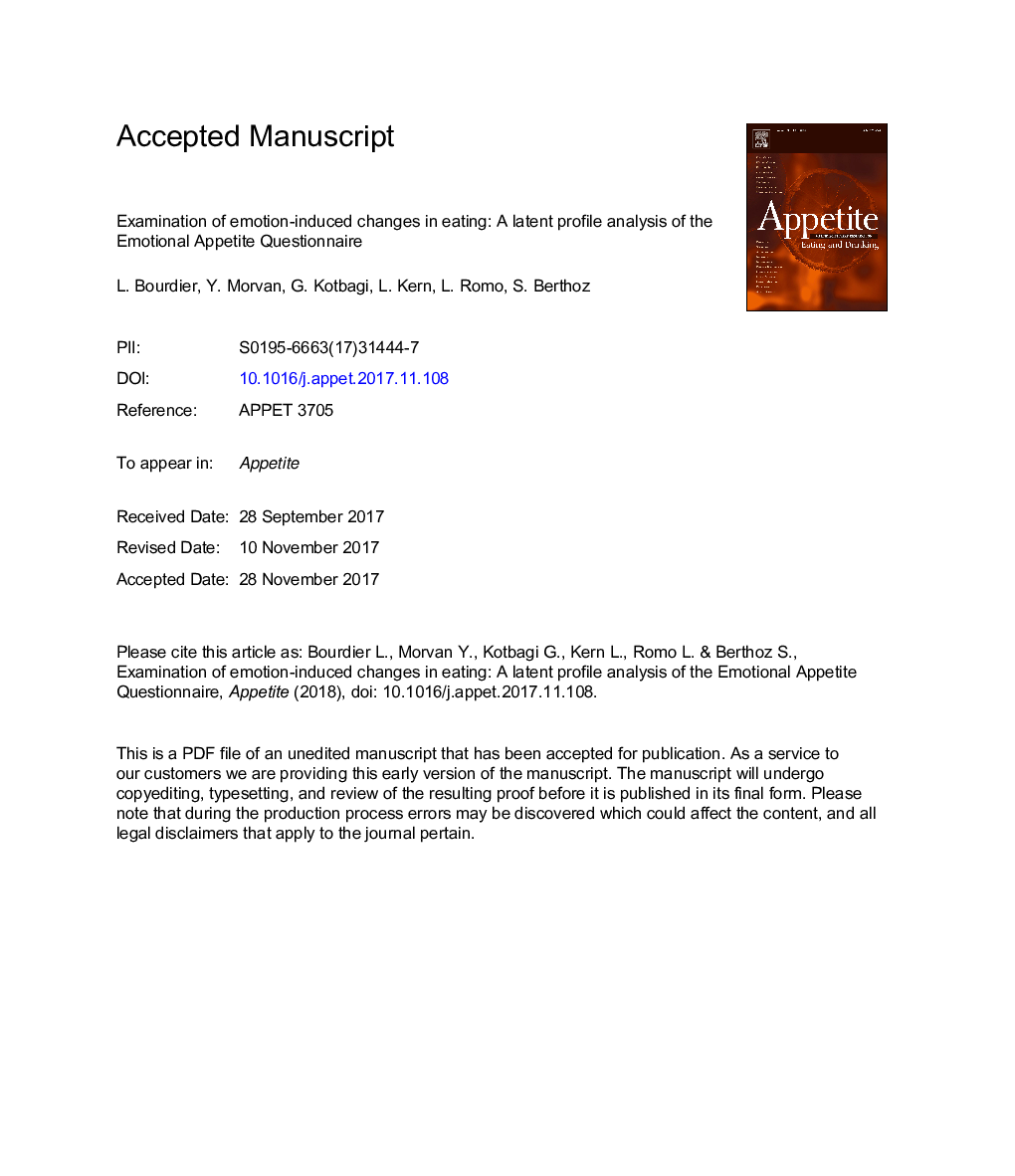| کد مقاله | کد نشریه | سال انتشار | مقاله انگلیسی | نسخه تمام متن |
|---|---|---|---|---|
| 7306003 | 1475357 | 2018 | 37 صفحه PDF | دانلود رایگان |
عنوان انگلیسی مقاله ISI
Examination of emotion-induced changes in eating: A latent profile analysis of the Emotional Appetite Questionnaire
ترجمه فارسی عنوان
بررسی تغییرات ناشی از احساسات در غذا خوردن: تجزیه و تحلیل مشخصات پنهان پرسشنامه ی هیجانی اشتها
دانلود مقاله + سفارش ترجمه
دانلود مقاله ISI انگلیسی
رایگان برای ایرانیان
کلمات کلیدی
خوردن احساسی، تجزیه و تحلیل مشخصات خاموش، پرسشنامه ی اشتیاق هیجانی، غذا خوردن، احساسات مثبت، احساسات منفی،
موضوعات مرتبط
علوم زیستی و بیوفناوری
علوم کشاورزی و بیولوژیک
دانش تغذیه
چکیده انگلیسی
It is now recognized that emotions can influence food intake. While some people report eating less when distressed, others report either no change of eating or eating more in the same condition. The question whether this interindividual variability also occurs in response to positive emotions has been overlooked in most studies on Emotional Eating (EE). Using the Emotional Appetite Questionnaire (EMAQ) and Latent Profile Analysis, this study aimed to examine the existence of latent emotion-induced changes in eating profiles, and explore how these profiles differ by testing their relations with 1) age and sex, 2) BMI and risk for eating disorders (ED) and 3) factors that are known to be associated with EE such as perceived positive/negative feelings, depression, anxiety, stress symptoms and impulsivity. Among 401 university students (245 females) who completed the EMAQ, 3 profiles emerged (P1:11.2%, P2:60.1%, P3:28.7%), with distinct patterns of eating behaviors in response to negative emotions and situations but few differences regarding positive ones. Negative emotional overeaters (P1) and negative emotional undereaters (P3) reported similar levels of emotional distress and positive feelings, and were at greater risk for ED. However, the people in the former profile i) reported decreasing their food intake in a positive context, ii) were in majority females, iii) had higher BMI and iv) were more prone to report acting rashly when experiencing negative emotions. Our findings suggest that a person-centred analysis of the EMAQ scores offers a promising way to capture the inter-individual variability of emotionally-driven eating behaviors. These observations also add to the growing literature underscoring the importance of further investigating the role of different facets of impulsivity in triggering overeating and to develop more targeted interventions of EE.
ناشر
Database: Elsevier - ScienceDirect (ساینس دایرکت)
Journal: Appetite - Volume 123, 1 April 2018, Pages 72-81
Journal: Appetite - Volume 123, 1 April 2018, Pages 72-81
نویسندگان
L. Bourdier, Y. Morvan, G. Kotbagi, L. Kern, L. Romo, S. Berthoz,
